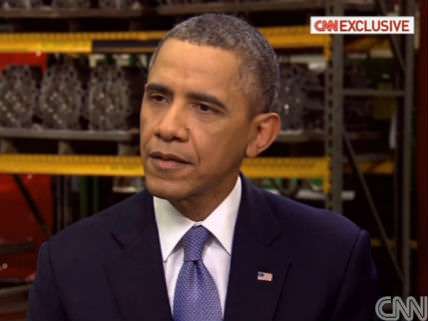Mark Kleiman Admits That Rescheduling Marijuana Would Have an Impact After All

Mark Kleiman continues to insist that I am "talking through [my] hat" on the subject of rescheduling marijuana, but the reason he gives for saying so has changed. At first he claimed I had exaggerated the impact of rescheduling, which was weird, since the post he was criticizing said nothing about the impact of rescheduling, focusing instead on the question of whether the Obama administration has the authority to reclassify marijuana without new legislation from Congress. As Kleiman conceded, the answer to that question is yes, although President Obama suggested otherwise in a CNN interview. In any case, Kleiman was clearly wrong to say that the "practical effect" of moving marijuana out of Schedule I would be "identically zero"—or, as he put it on Twitter, that "rescheduling does nothing." He has since retreated from that position without acknowledging that he has ceded any ground. Now he says rescheduling marijuana would be "mostly pointless" and/or that its effects would be "mostly symbolic." These clams are more defensible, although advocates of rescheduling might nevertheless take issue with them (especially the first one).
So what is Kleiman now claiming I got wrong? He thinks I should not have suggested that Obama himself has the power to reclassify marijuana. "In fact," Kleiman writes, "the Controlled Substances Act [CSA] gives that power to the Attorney General," who "has delegated his responsibility to the DEA Administrator." I am aware of that, which is why I said, in the very post that prompted Kleiman's initial tirade, that the CSA "gives that [rescheduling] power to the attorney general, who has delegated it to the Drug Enforcement Administration." I nevertheless think it is reasonable to believe Obama might have some influence over his own attorney general, an appointee he can fire at will.
Which brings us to the letter that Rep. Earl Blumenauer (D-Ore.) and 17 other members of Congress sent the president last week. Blumenauer et al. argue that marijuana does not meet the criteria for Schedule I and urge Obama to "instruct Attorney General Holder to delist or classify marijuana in a more appropriate way, at the very least eliminating it from Schedule I or II." Kleiman says these legislators do not understand the law either, but it is not clear why he says that. "It's not as simple as someone saying, 'Gee, I'd like to reschedule cannabis this morning,'" Kleiman writes, since the CSA lays out a process to follow, including consultation with the Department of Health and Human Services. That is true, but I do not see where Blumenauer et al. claim otherwise. Although rescheduling would not happen instantly, even beginning the process could help advance the debate about marijuana prohibition by calling attention to the questionable distinctions drawn by our drug laws.
Kleiman emphasizes that the attorney general's rescheduling power is "not arbitrary." That's true in the sense that his power is constrained by the statute in certain ways. For example, the CSA's reference to treaty obligations seems to preclude removing marijuana from the schedules entirely. But as Alex Kreit notes, the CSA gives the attorney general (and therefore the DEA) a great deal of discretion in interpreting and applying the scheduling criteria, since it leaves key terms such as "potential for abuse" and "accepted medical use" undefined. The DEA has bent over backward to justify keeping marijuana on Schedule I, and nothing in the statute requires it to do that.


Show Comments (60)